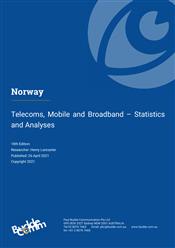Norway Telecoms Market Report
Telecoms, Mobile and Broadband - Statistics and Analyses

Norway’s telecom regulator consults on late-2021 5G auction
In common with other Scandinavian countries, Norway has a sophisticated telecom market with high broadband and mobile penetration rates and a highly developed digital media sector. Although not a member of the European Union, the country’s telecoms sector is synchronised with relevant EC legislation. Telenor is the dominant operator in all sectors, though there is increasing competition from new entrants. Telia Norway increased its market share by acquiring the operations of Tele2, Phonero and Get.
Norway enjoys near comprehensive LTE coverage, while both Telenor and Telia are looking to close their 3G and 2G networks (by 2020 and 2025 respectively), focussing instead on LTE and 5G technologies. The mobile broadband sector was bolstered by the auction of spectrum in the 700MHz and 21MHz band in June 2019. Additional spectrum in the 700MHz is expected to be auctioned for mobile broadband use (5G) in 2021.
The broadband penetration rate is among the highest in Europe, while in recent years subscribers have been migrated to faster broadband solutions over fibre networks, VDSL and upgraded cable infrastructure. The leading ISPs Telenor and NextGenTel have also deployed services based on G.fast technology.
The regulator has called on the government to help fund additional cable infrastructure to reduce the country’s dependence on Telenor’s networks. In late 2019 the government proposed making broadband of at least 20Mb/s a universal service.
This report introduces the key elements of Norway’s telecom market, providing statistics and an overview of the regulatory environment, the fixed network operators and their services, and telecom infrastructure. The report also profiles the mobile voice and data market, providing statistics on the main operators, a review of the key regulatory issues, and a snapshot of the consumer market for services. In addition, the report covers the fixed and fixed-wireless broadband sectors, together with developments in related technologies such as Broadband Powerline.
BuddeComm notes that the outbreak of the Coronavirus in 2020 is having a significant impact on production and supply chains globally. During the coming year the telecoms sector to various degrees is likely to experience a downturn in mobile device production, while it may also be difficult for network operators to manage workflows when maintaining and upgrading existing infrastructure. Overall progress towards 5G may be postponed or slowed down in some countries.
On the consumer side, spending on telecoms services and devices is under pressure from the financial effect of large-scale job losses and the consequent restriction on disposable incomes. However, the crucial nature of telecom services, both for general communication as well as a tool for home-working, will offset such pressures. In many markets the net effect should be a steady though reduced increased in subscriber growth.
Although it is challenging to predict and interpret the long-term impacts of the crisis as it develops, these have been acknowledged in the industry forecasts contained in this report.
The report also covers the responses of the telecom operators as well as government agencies and regulators as they react to the crisis to ensure that citizens can continue to make optimum use of telecom services. This can be reflected in subsidy schemes and the promotion of tele-health and tele-education, among other solutions.
Key developments:
- Telenor creates a smart building subsidiary;
- Regulator consults on proposed multi-spectrum 5G auction set for September 2021;
- Regulator recommends measures to reduce dependence on Telenor's network;
- Telenor to phase out PSTN infrastructure and close its GSM and 3G networks by 2025;
- Regulator makes available 700MHz and 900MHz spectrum for offshore use;
- Telia achieves speeds of 1Gb/s on its LTE infrastructure;
- Telenor to migrate all DSL subscribers to fibre by 2023;
- Telenor and NextGenTel pursue G.fast technology;
- Municipalities access EU-funded public Wi-Fi scheme;
- Report update includes the regulator's market data to June 2020, telcos' operating and financial data to Q4 2020, assessment of the global impact of Covid-19 on the telecoms sector, recent market development.
Companies mentioned in this report:
Telenor, Telia Norway, Tele2, BaneTele, NetCom, Mobile Norway, Teletopia, Telio, Lyse Tele (Altibox), Nordisk Mobiltelefon
Related Reports
- Europe - Mobile Network Operators and MVNOs
- Luxembourg - Telecoms, Mobile and Broadband - Statistics and Analyses
- Montenegro - Telecoms, Mobile and Broadband - Statistics and Analyses
- Denmark - Telecoms, Mobile and Broadband - Statistics and Analyses
- Czech Republic - Telecoms, Mobile and Broadband - Statistics and Analyses
- Greece - Telecoms, Mobile and Broadband - Statistics and Analyses
- Cyprus - Telecoms, Mobile and Broadband - Statistics and Analyses
- Belarus - Telecoms, Mobile and Broadband - Statistics and Analyses
- Austria - Telecoms, Mobile and Broadband - Statistics and Analyses
Share this Report
TMT Intelligence
A platform to scale your intelligence tasks
Monitor critical insights with our AI-powered Market Intelligence Platform gathering and analyzing intelligence in real time. With AI trained to spot emerging trends and detect new strategic opportunities, our clients use TMT Intelligence to accelerate their growth.
If you want to know more about it, please see:
Research Methodology
BuddeComm's strategic business reports contain a combination of both primary and secondary research statistics, analyses written by our senior analysts supported by a network of experts, industry contacts and researchers from around the world as well as our own scenario forecasts.
For more details, please see:
More than 4,000 customers from 140 countries utilise BuddeComm Research
Are you interested in BuddeComm's Custom Research Service?
Hot Topics
News & Views
Have the latest telecommunications industry news delivered to your inbox by subscribing to BuddeComm's weekly newsletter.